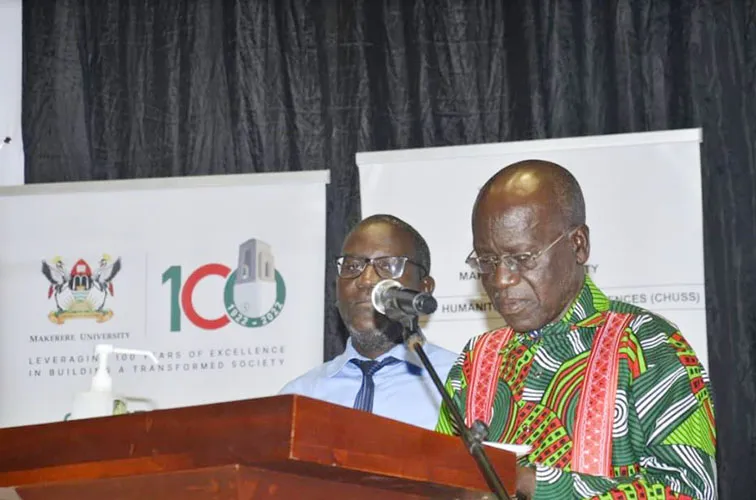By Kefa Senoga
A fountain of knowledge. A man gifted with words. A man who can weave words to create a magical appeal. These were some of the descriptions bestowed on Prof. Timothy Wangusa as the academia gathered on July 8, 2022, to celebrate a man who has contributed to Uganda through the spoken and written word.
The event, whose theme was Celebrating Wangusa@80, was convened by Uganda’s Makerere University as part of activities to celebrate 100 years of the university. It also coincided with a celebration of 80 years of the literary giant. Wangusa, a poet and novelist, was born on May 20, 1942.
Wangusa also is a name known at Uganda Christian University (UCU), where he played a key role in establishing the department of languages and literature in the School of Education. A research fellow at UCU from 2003 to 2005, he was a research supervisor and was instrumental in developing UCU’s Master of Arts and PhD program in literature.

At 27 years, Wangusa joined Makerere as an academic. Six years down the road, in 1975, he bagged a PhD in literature, becoming the first person to acquire the qualification at Makerere. Six years later, Wangusa became one of the few African professors at Makerere.
Wangusa jokingly refers to himself as the mean point between Makerere University with it’s 100 years of existence and Uganda with its 60 years of independence this year
“If you add 100 years of Makerere to 60 years of Uganda and divide by 2, you get me,” Wangusa explained to the July 8 audience.
Wangusa, who hails from Manafwa district in eastern Uganda, says throughout his teaching and writing career, he has emphasized the mutual importance of the spoken and the written word.
One of his inspirations for the “economy of words,” Wangusa narrates, is when, at the age of 10, he attended Sunday school in the eastern Uganda region of Bugisu, his native area. He says the preacher summed up his message in four words: “Always love one another.” To Wangusa, if anyone practiced the love for one another, they will have obeyed all the Ten Commandments.
As a teacher, he says he found it difficult to teach what he calls the most difficult doctrine to comprehend, the doctrine of the Trinity. He says, in his wisdom, he attempted to define God to his students, by coming up with the Trinity Tree, which he described in a 15-word poem:
The father in the root
The son in the shoot
The spirit in the fruit
Wangusa says that his discovery of the significance of the economy of words has informed his career and he testifies that he has been inspired by words which have guided his humanness of character and style of writing.
“My first novel – Upon This Mountain – could have been four times longer if I had been an expansionist, but I am a ‘compactionist’,” he said. The novel, which is 116 pages, is part of the literature syllabus for many secondary schools in Uganda.
The event at Makerere University also was used to launch Wangusa’s latest books – I Love You, You Beast, a book where he shares reflections on faith and literature from 1969 to 2009; Pathfinders’ Footprints in Modern African Poetry, a collection of poems; Lost in Wonder, his autobiography; and Niyanga Nilaliila, a translated autobiography in Lumasaaba, his native language.
Arthur Gakwandi, a novelist, short story writer, diplomat and Makerere lecturer, said Wangusa creates “cryptic communication, packed with meaning and difficult to comprehend.”
“He can find meaning in simple things,” Gakwandi said. “He can see the supernatural in ordinary things, a tree or object, which most people ignore. He then finds a word to communicate that momentary insight.”
Dr. Susan Kiguli, a poet and senior lecturer of literature at Makerere, said she always thought that great writers were only dead people. So, when she came across poems and novels by Wangusa in secondary school, she had no reason to believe that the professor was still alive.
“However, when I joined Makerere University, I was shocked to learn that Wangusa was one of our lecturers,” Kiguli said. “Being a man of small stature, he did not tower over us. But when he began to speak, he was larger than life. He is small, but carries a mountain of achievements.”
Peter Mugume, a lecturer at UCU, says he first met Wangusa as his undergraduate teacher at Makerere University. He says he later got the opportunity to work with Wangusa as a colleague lecturer in the department of literature at UCU.
Wangusa attended Nabumali High School from 1958 to 1961 for O’level, before joining King’s College, Budo for A’level from 1962 to 1963. From Budo, he joined Makerere University, where he pursued a Bachelor of Arts in English course, and then to the UK’s University of Leeds for a master’s degree in literature.


